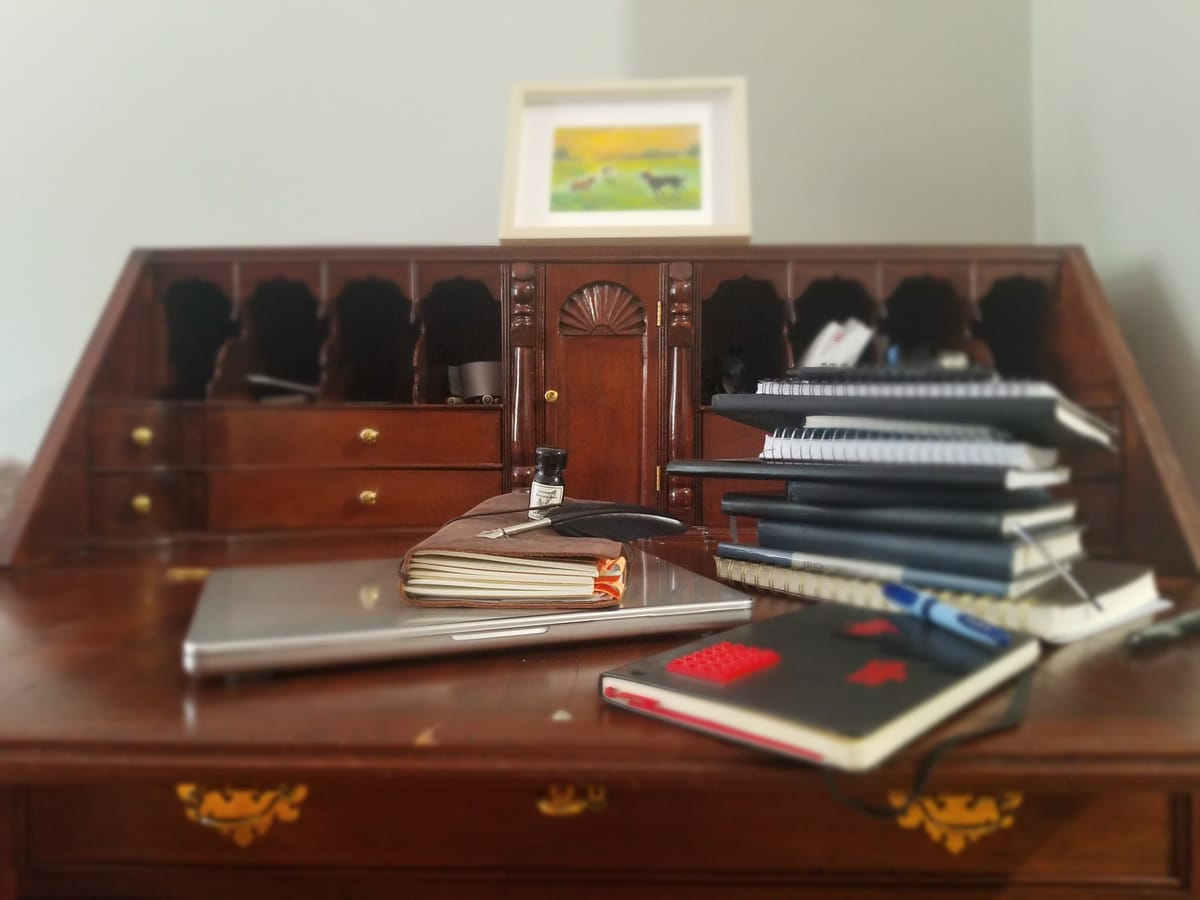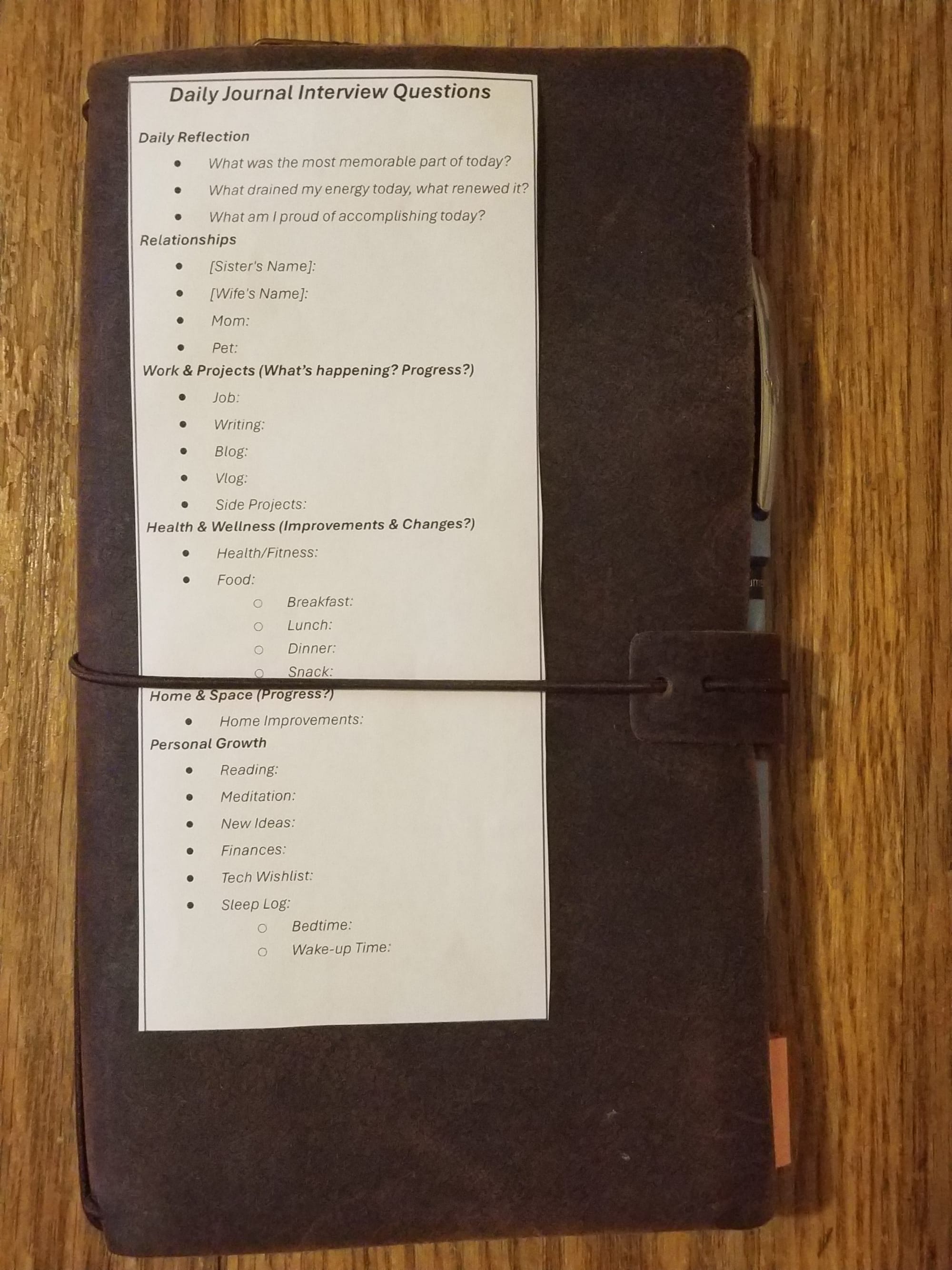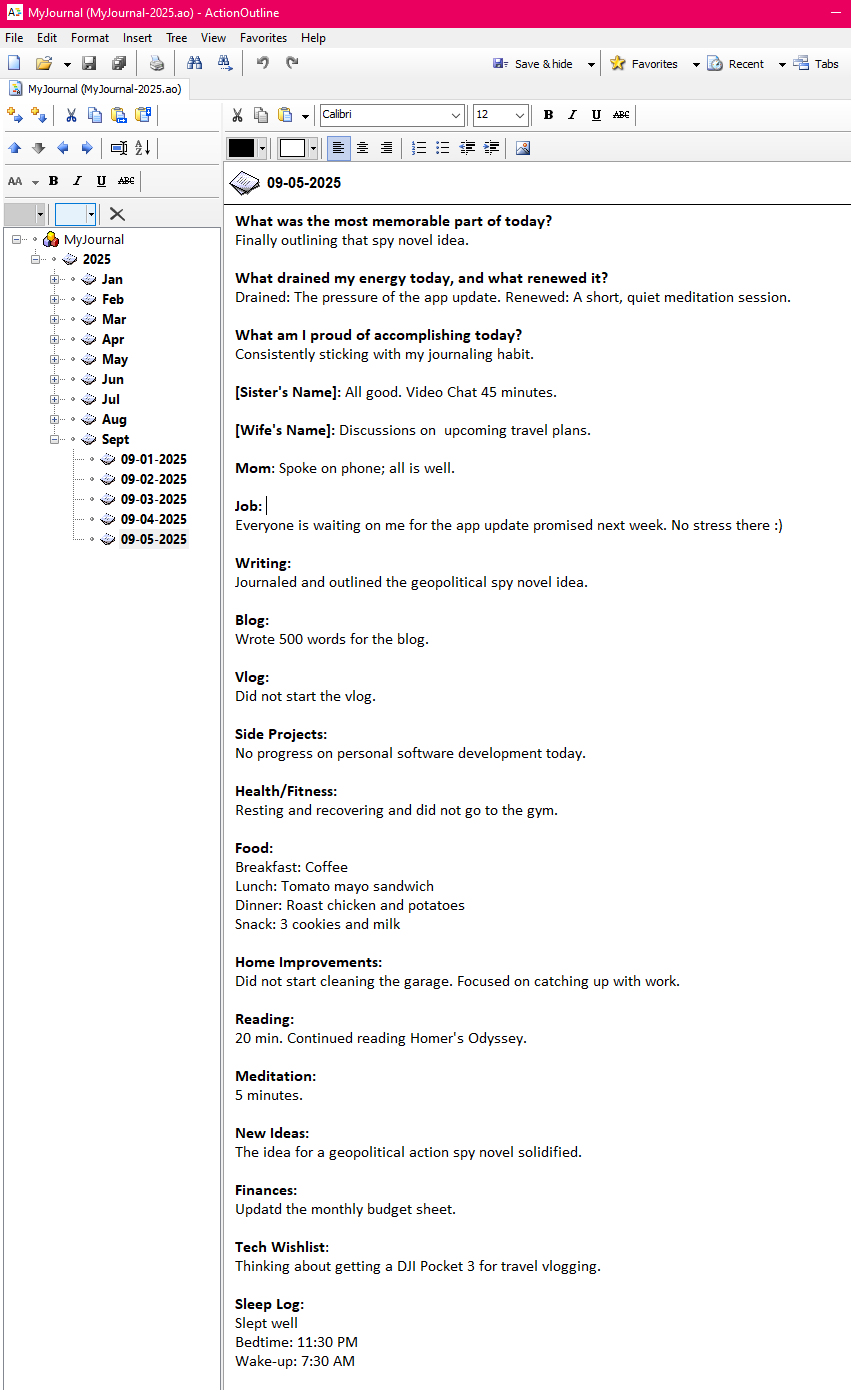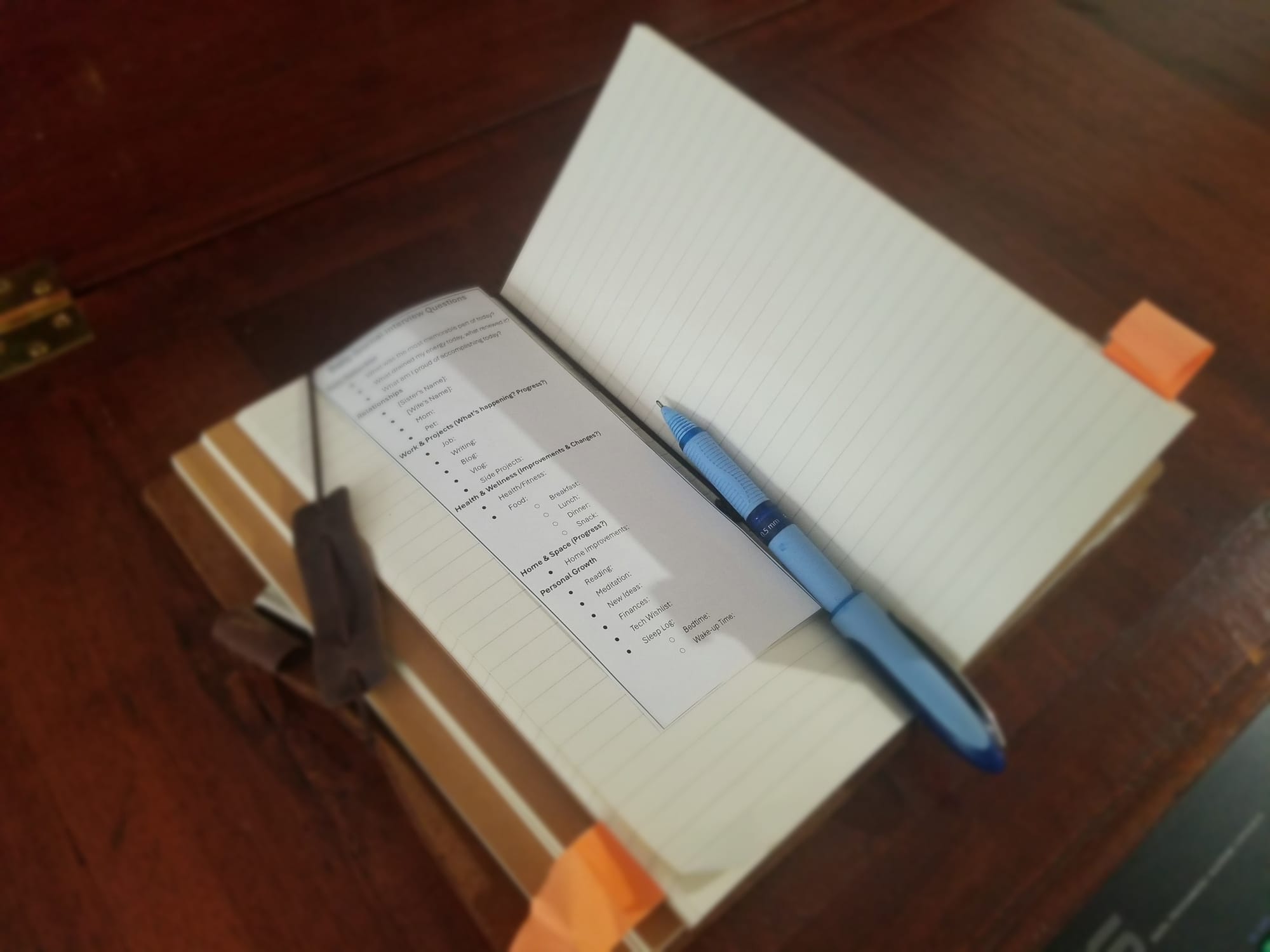The Socratic Journal Method: A Simple Journaling Method That Actually Works
Journaling doesn’t need to be a chore. In this post, I share The Socratic Journal Method, my simple twist on journaling that turns blank pages into meaningful conversations. It’s a method designed to help you reflect, stay consistent, and actually enjoy the process.

Why I Created the Socratic Journal Method
Over the years, I’ve perfected my journaling habit. It didn’t happen overnight; like most people, I started and stopped more times than I can count. Journaling has a long list of benefits (I’ll get to those soon), but what surprised me most was what I discovered when reflecting on why my method works so well.
I’ve always loved ancient Western philosophy, Plato, Socrates, Aristotle, and others. They were obsessed with a single, guiding principle, best stated by Socrates himself: The unexamined life is not worth living.
But only recently, while researching how I could share my journaling experience with you, did I realize something: the way I journal is strikingly similar to how Socrates himself framed his thinking.
That’s why I now call my approach The Socratic Journal Method. It’s a simple way of journaling where you treat the page like an interview, asking yourself questions and answering them. Once you try it, I believe you’ll find it much easier to stick with journaling.
I’m convinced of its effectiveness because this isn’t just a technique; it’s a shift in how you approach the page. With it, you don’t just write, you discover. And once you try it, you may look forward to your next journal entry.
Why Journaling Matters (Backed by Psychology)
Journaling isn’t just a feel-good hobby, it’s one of those rare habits where science, psychology, and even ancient wisdom all agree.
In the 1980s, psychologist James Pennebaker ran studies showing that when people wrote about their thoughts and emotions, their stress levels dropped, moods improved, and even their immune systems got a boost.
Carol Dweck, known for her work on the growth mindset, emphasizes the power of metacognition, thinking about your thinking. That’s exactly what happens when you write a journal: you stop running on autopilot and start reflecting.
Behavior scientist BJ Fogg reminds us that habits stick when they’re small and easy. Journaling fits perfectly into that framework. A few honest sentences a day can compound into real clarity and resilience.
So, whether it’s stress relief, clearer thinking, or simply building a ritual that grounds you, journaling promotes more benefits than most self-help fads combined. The challenge is sticking with it, and that’s where my struggles come in.
My Struggle with Traditional Journaling

Early on, at the beginning of my journaling routine, it felt more like a chore than a habit. I’d pick up a fresh notebook, write for a few days, and then stop. The blank pages stared back at me.
I never knew what to write. Do I write about my breakfast? Vent about my day? Try to sound insightful? Every time, it felt forced, and eventually, I’d quit.
Everything changed when I started treating journaling as if I were being interviewed. That mental trick cleared away the pressure. Instead of staring at a blank page, I had a question to answer. It turned journaling into a dialogue, not a monologue.
Example:
Q: What’s weighing on you right now?
A: Stressed about tomorrow’s deadlines, but half of it is just me overthinking.
That was it, one question, one answer. Suddenly, it felt natural.
Journaling Tools: From Paper to Digital and Audio
Let's get one thing straight: journaling doesn't require a fancy, expensive notebook. The magic is in the practice, not the parchment. You can start with a simple legal pad and a chewed-up pen and still reap all the benefits.
That said, for many of us -myself included- the “fun” tools can make the ritual something to look forward to. If you're like me, a trip to the stationery store is a soul-warming experience. There's something about the tactile pleasure of finding that next gem of a journal with just the right paper weight, or the perfect pen that glides effortlessly across the page. For some, this hunt for the ideal tools is a cherished part of the process.
I use my physical journals primarily for brainstorming, capturing raw ideas, and quick notes. It’s been proven that there's a unique cognitive connection between handwriting and creativity that I find invaluable. Later, I often transcribe and expand on these ideas in my digital system, which becomes their permanent, organized home.
Modern journaling boils down to three main forms, each with its own pros and cons.
Paper and Pen. The Classic Touch.
- The Experience: This is the timeless option. The physical act of writing slows down your thoughts, which is perfect for brainstorming, deep reflection, and boosting memory retention. It’s also completely free from digital distractions.
- My Take: To be perfectly honest, the tactile feeling of writing on paper goes deep into my heart and soul, and for many, this method is the first and only choice, and I can truly understand why. The main consideration for some is that it can be less practical for quickly searching through past entries compared to digital text.
2. Digital Typing. The Modern Powerhouse
- The Experience: This is a powerful method for daily journaling. It's fast, searchable, and incredibly efficient for digital nerds. Using templates in text files or dedicated apps helps maintain consistency and saves time.
- My Tool of Choice: I use a program called ActionOutline (though it's Windows-only). Its outline format works well for how I organize my journals. Since I'm often at my PC, it's easy to access for a quick session with zero friction.
- The key is to experiment. The list of apps is long (like Obsidian, Notion, Day One, or even basic Google Docs). My advice is to grab free trials and see which system suits your style and workflow best. The goal is to remove barriers, not create them.
3. Audio or Video Recording. Journaling on the Go
- The Experience: This is a great option for long dog walks, commutes, or any time your hands are busy. You can speak your stream of consciousness far faster than you can write it. It’s incredibly raw and authentic.
- Pro Tip: Keep a list of prompts or interview questions in your car or on your phone to glance at before you start recording. This helps guide your session if you're not sure what to talk about. You can always transcribe the content later for a searchable text record or just let it live as a time capsule of your thoughts.
The bottom line? The best tool is the one you’ll use consistently. Don't get paralyzed by choice. Experiment with each format and see what you enjoy most. You might find, as I have, that a hybrid approach - using different tools for different purposes- is the ultimate way to make journaling a lasting and rewarding habit.
Enjoying the journey so far?
If you like deep dives into creative chaos, productivity under pressure, and nerdy lessons from real-life experiments, subscribe to get future posts delivered right to your inbox. Subscribe Now
The Socratic Journal Method: A Framework for Dialogue

Journalling does not need to feel like a chore. Don’t think it requires profound, elegant prose. It does not. My breakthrough came when I stopped writing and started conversing. I developed what I call The Socratic Journal Method.
This approach transformed journaling from a task into a natural method of expressing my thoughts on paper, setting them free from the echo chamber of my mind.
The key is to master this two-stage rhythm:
- Think deeply upfront: Carefully design your core 'interview questions' to reflect what truly matters to you.
- Write freely after: When it's time to journal, silence your inner editor. Let your answers pour out effortlessly, like opening a water faucet.
It’s this combination of structure and release that works. The questions provide a gentle guide rail, preventing the panic of a blank page. The act of answering them freely allows for uncensored self-expression and genuine discovery. Over time, this practice did more than just log events, it allowed me to see the patterns of my own thinking; what was serving me, what wasn’t, and where my true priorities lay. It became a tool for clarity, not just accountability.
Remember, you're not writing for an audience; you're releasing and examining your own thoughts, just as Socrates intended.
See It In Action: A Page from My Journal

My core set of questions is designed to tap into what matters. The answers can be short, long, factual, or emotional. The goal is authenticity, not length. For example;
- Q: What felt light today? What felt heavy?
- A: Heavy: The weight of a looming deadline. Light: The ten minutes I spent laughing with my wife. (Just writing shows me where I need to balance.)
- Q: What thought kept circling in your mind today?
- A: The idea that I'm not moving forward on my book. (Writing it down, I realize that it's simply fear, not a fact. Now I can question it: what's one small step i can do tomorrow?)
- Q: What could I have improved today?
- A: I scrolled on my phone for too long this evening, instead of working on my book. (Seeing it on paper makes it impossible to ignore. I'll address it tomorrow.)
Evolve Your Questions, Evolve Your Focus
This method is alive. The questions that serve you today might not be relevant in three months. Perhaps you need to ask about a specific project, a relationship, or a personal fear. When that issue is resolved or changes, let the question change with it. Review your prompts frequently. This ensures your journal remains a true reflection of your inner world, always capable of releasing what needs to be expressed.
A Quick Word of Caution: Keep It a Conversation, Not an Interrogation
While the structure of a method like this is powerful, it's crucial to remember the core purpose of journaling, as backed by decades of research. Pioneering psychologist James Pennebaker, whose work laid the foundation for expressive writing, found that the greatest benefits, like reduced stress, improved mood, and even a stronger immune system, come from the act of honest expression and emotional release, not from rigid self-analysis.
The moment your journal becomes a tool for self-judgment, it loses its power. It should feel like a conversation with a supportive friend, not a performance review with your toughest critic.
How do you know if you've crossed the line? Watch for these signs:
- You feel dread at the thought of opening your journal.
- You obsess over metrics (e.g., word counts, steps, perfect streaks) instead of exploring your feelings.
- You use it to punish yourself for perceived failures rather than to understand them.
If this happens, it's not a sign of failure; it's a sign to pivot. The beautiful thing about your journal is that you make the rules.
Rewrite your questions from a place of curiosity, not criticism:
- Instead of: "Why did I miss the gym again?"
- Try: "What was happening today that made the gym difficult? What could make it easier tomorrow?"
- Instead of: "Why was I so unproductive?"
- Try: "What was draining my focus today? What one small task would feel good to complete first thing tomorrow?"
The ultimate goal is to look forward to this time. Your journal is a tool to clear your head, process your experiences, and document your unique journey. It should be a place that reduces your stress, not becomes a source of it.
Why The Socratic Journal Method Works

Socrates believed wisdom came from questions, not answers. That’s exactly what happens in this method: the questions guide you toward clarity.
Therapists use Socratic questioning to help clients challenge beliefs and reframe problems. When you journal this way, you’re doing the same thing for yourself.
BJ Fogg’s habit science also explains why it sticks. One question, one answer, and you’ve completed your entry. No pressure to write a masterpiece.
Adding small metrics makes it even more effective. You’re not just reflecting; you’re tracking real patterns in your life. Over time, those patterns help you see what’s working, what isn’t, and where to adjust.
Your First Dialogue: A 5-Minute Guide to Starting Tonight
Remember, you don't need a fancy journal or a degree in philosophy to start. All you need is a piece of paper, a notes app, or even a voice memo. Here’s your quick-start guide:
- Ask One Honest Question. Start with a single, simple prompt that encourages reflection.
For example:- What's one thing that's occupying my mind right now?
- What was a small win from today?
- What would make tomorrow a little better?
- Answer with Raw Honesty. Don't edit, don't judge, just write. A single sentence is a perfect start. The goal is to get the thought out of your head, not to write a masterpiece.
- Note One Thing You're Tracking. Pick one metric that matters to you right now, sleep hours, mood, steps, or time spent on a project or relationship. Just log it. No commentary needed.
- Keep the Tone Light and Curious. This is a conversation with your future self, not a performance review. If a question feels like a burden, change it. Instead of "Why did I fail?" try "What was the obstacle today?"
That's it. In just a few minutes, you'll have created a snapshot of your day, a moment of clarity, a point of accountability, and a record you'll be grateful for later.
Closing Thoughts on the Socratic Journal Method

When I look back at my old journals, I see scattered entries, half-hearted starts, and plenty of blank pages. But everything changed once I shifted to treating journaling like a conversation, built on questions, honest answers, and a few meaningful metrics.
That’s the power of the Socratic Journal Method. It’s not about perfect entries. It’s about showing up, asking yourself better questions, and tracking what matters most to you.
Try it for just one week. One question, one answer, one small metric. See how it feels. You might just find yourself looking forward to your next entry, not because it's another task, but because it's the one place you get to pause, reflect, and be fully honest with yourself.
Stay curious, stay kind, and keep journaling!
Note: This article reflects my personal experience and opinions. While writing has been helpful for my mental clarity and well-being, it is not a substitute for professional mental health care. If you're struggling with stress, anxiety, or emotional challenges, please consult a qualified healthcare provider.